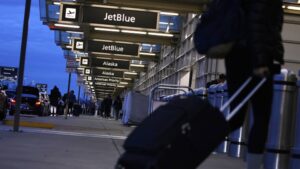JetBlue Airways Offers Voluntary Early Retirement Packages Amid Cost-Cutting Measures
As the airline industry continues to navigate post-pandemic challenges, JetBlue Airways has recently announced an intriguing development: the offering of voluntary early retirement packages to select pilots. This initiative, detailed in a memo from the Air Line Pilots Association (ALPA), signals JetBlue’s ongoing efforts to optimize its operations, particularly in the wake of a significant engine recall affecting several aircraft.
Insights Into the Early Retirement Packages
In a strategic move aimed at both reducing labor costs and enhancing revenue, JetBlue’s decision comes at a pivotal time for the airline. The offered voluntary separation packages are designed for pilots who will be 59 years old or older by March 31. Given that the federally mandated retirement age for U.S. commercial airline pilots is 65, this offer presents a choice for seasoned aviators who may wish to exit the workforce earlier.
According to details from the ALPA, pilots participating in the voluntary program will receive compensation equivalent to 55 hours of their hourly pay rate, extending either to their mandatory retirement date or 18 months post-agreement—whichever occurs first. For instance, a captain with 12 years of experience on the Airbus A320 expected to retire at 65 could receive a substantial payout of over $416,000, while a captain operating an Embraer E190 with eight years of experience may see a payout close to $161,000.
The Business Context
JetBlue’s decision to offer these packages aligns with broader trends in the airline industry, where airlines are reassessing their workforce and operational strategies to mitigate the financial strain from various challenges. Amid an environment of rising operational costs, the addition of premium offerings, like new first-class seat configurations, is part of a multi-faceted approach by JetBlue to enhance its competitive positioning.
Furthermore, the airline industry has been wrestling with supply-chain disruptions and workforce shortages, exacerbated by lingering effects from the COVID-19 pandemic. JetBlue’s proactive step to reduce its pilot workforce, while maintaining rigorous operational standards, is a calculated risk in pursuit of long-term viability and improved profit margins.
Looking Ahead
JetBlue is set to report its quarterly results shortly, and all eyes will be on how this voluntary retirement program impacts both the operational structure and financial performance. As the frontline of airline operations, pilots play a crucial role in customer experience, and their potential exit could raise questions about staffing and flight schedules in the months to come.
For investors and industry observers, JetBlue’s moves warrant close attention as they may provide valuable insight into airline recovery strategies in a competitive landscape. The results of this initiative could serve as a precursor for future actions by other airlines navigating similar operational and financial hurdles.
Final Thoughts
At Extreme Investor Network, we understand the complexities and intricacies of the airline industry and its economic implications. Keeping an eye on JetBlue’s strategic shifts not only informs us about the airline’s future but also provides key lessons about adaptability in face of industry challenges. Stay with us for more insightful analyses and updates on the dynamic world of business and investments.
What are your thoughts on JetBlue’s early retirement packages? How do you think this will influence the airline’s performance in the future? Share your insights in the comments below!

